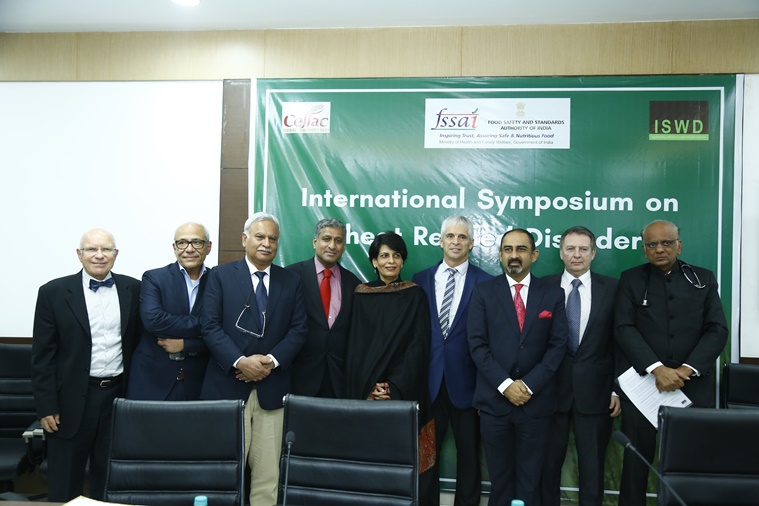Written by Sukanya Nandy |New Delhi |Published: January 16, 2019 1:30:07 pm
Gluten Intolerance: The rising problem of wheat-related disorders
The International Symposium on Wheat related Disorders (ISWD) 2019 organised by the Celiac Society of India (CSI) in January in Delhi aimed to create awareness about early diagnosis and management of the disease of which "Indian have little or no knowledge".

Wheat has been listed among the top eight allergens in the world and adverse reactions to this cereal grain can be in the form of an allergy, skin rashes, bloating, digestive disorders or other intolerances. To create awareness about early diagnosis and management of the disease of which Indians generally “have little or no knowledge”, the International Symposium on Wheat related Disorders (ISWD) 2019 was organised in the Capital by the Celiac Society of India (CSI) from January 10-13. Gluten allergy, also known as celiac disease, is an autoimmune disease that occurs because of ingestion of a protein, called gluten, which is present in the cereals – wheat and barley. In these patients, the gluten protein is not digested completely and that leads to damage of the small intestine, where food is absorbed. With the damage of the small intestine, the food is not absorbed and thus, these patients fail to grow in height and weight, develop chronic diarrhea, anemia (low hemoglobin), and weakness of bones.

Tom O’Bryan, the founder of theDr.com and one of the panelists at the ISWD explained that according to a study, every one in nine persons suffers from diseases caused by wheat. He further added, “Wheat is a primary inflammatory trigger and for some people, it is the mechanism that causes diseases.” Right from Lady Gaga and Victoria Beckham to Virat Kohli and Anushka Sharma, many celebrities have opted for gluten-free diet. According to O’Bryan, wheat is the new sugar. “Everyone knows that sugar is not healthy for your body but we all need a little sugar. It’s the same with wheat. It’s not good for anybody but we all need a little wheat. And for some people, it the primary problem that causes the continuation of some of their health issues”, he added.
But unlike celiac disease, not many people are aware of non-celiac gluten sensitivity. “The main difference celiac and non-celiac disease are between their mechanisms,” explained Ms. Ishi Khosla, Founder President, Celiac Society of India to indianexpress.com. According to National Center for Biotechnology Information (NCBI), non-celiac disease has been defined as “the onset of a variety of manifestations related to wheat, rye and barley ingestion, in patients in whom celiac disease and wheat allergy have been excluded.” Khosla says, “Manifestations and control remain same for both types of diseases. There’s a difference in the intestinal damage. Celiac disease has a higher degree of intestinal inflammation. But for both, celiac and non-celiac disease, there has to be a genetic predisposal. If there’s a problem in the genes it can definitely affect.”
The symptoms of non-celiac gluten sensitivity include bloating, gas or abdominal pain, diarrhea or constipation, nausea, headache, brain fog, joint pain, numbness in the legs, arms or fingers and fatigue. In order to spread awareness, one has to know the symptoms of the celiac disease first. Khosla adds, “Sometimes it so non-specific that symptoms may not be there at all. In that case, do check if there is a family history of celiac related diseases. For example, if their’s a family history of cancer, then it is important to screen for celiac. The beginning of most diseases is inflammation and wheat is one of the causes of the inflammation.”
According to Prof. (Dr) Anupam Sibal, Apollo Hospitals Group, “One should not go on a completely gluten-free diet just on the basis of a blood test.” On a similar note, Ms. Khosla adds, “It is good to be on a diet for a few months and then reintroduce it. Once you are back in the diet, then check if the same symptoms are there. If it is still there, then you are wheat sensitive. When the gut breaks down, supplements are given accordingly.”
Dr. Sibal also pointed out that celiac disease may depend on a location. “Celiac disease is a common problem in North and East India but not so much in South India. According to a survey conducted by the Indian Council of Medical Research, in Haryana the prevalence of the disease is 8 people per thousand, in Assam, it is 4 per thousand and in Tamil Nadu, it is only 0.1 per thousand. So, we have a lot of variation.”


































No hay comentarios:
Publicar un comentario